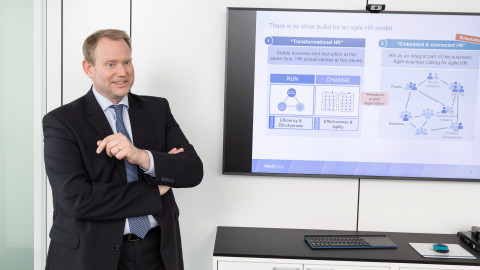Johannes Brinkkötter: Processes will no longer be as much of a HR focus as they have been in the past. Digitization is forcing companies on a path of transformation, away from highly standardized processes, towards individualized services. In the future, it will be more about people; about employees, executives and external customers.
Johannes Brinkkötter: Even if the focus is on people, processes will continue to play a role, for example in the context of legal and regulatory requirements. Or where high process reliability is required and administrative tasks have a high efficiency focus, for example in payroll accounting, where there is only right or wrong.
Johannes Brinkkötter: ... which has been heavily process oriented in its development until now. From an expert's point of view, it is generally only the isolated process that is considered. In the future, the employee's perspective will be given a higher priority. They will have a greater autonomy at work and be able to control their own HR calendar, for example, by the way of intra-year performance snapshots. And these will be much more development-orientated than an annual form-filling ritual with the goal of dutifully putting a check mark somewhere.
Johannes Brinkkötter: Without question, but this is also gladly taken on board. Example: Learning. User generated content will gain in importance, such as the uploading of simply created videos etc., which are then available for everyone to learn from. Here, too, HR can provide a platform that empowers employees to act with greater autonomy, to exchange ideas and to learn from each other. In this regard, there is also a transformation towards a new level of quality in self-service taking place.
Johannes Brinkkötter: That's it. Reviews, suggestions, playlists etc. - Spotify, YouTube and so on set standards that are also expected in the working environment. And if you can find day care spaces like you order on Amazon – with the same transparency and speed throughout the entire process – then “Self Service 4.0” not only becomes fun but also relieves HR's workload. Therefore, digitalization enables HR to be more people focused and more strategic in their actions at the same time and to drive transformation forwards.
Johannes Brinkkötter: First of all, a change of approach is required. This means seeing things from the perspective of employees, executives and external customers and designing HR products and services accordingly. However, it is also a question of whether you want to be driven or be the one doing the driving.
Johannes Brinkkötter: Let me illustrate my point by using the recruitment process as an example: Where as human resources departments used to have a quality based, gate-keeping function, in the sense of appropriate selection procedures with good aptitude diagnostics, etc., today sourcers need a business and sales mindset whose main motivation is the candidate’s signature on the contract. In a figurative sense, they are hunters, who are passionate in offering candidates a high quality experience to the point of employment and beyond.
Johannes Brinkkötter: Companies that want to take on a speedboat business model will only become truly agile when they manage to quickly mobilize interdisciplinary, temporarily assembled teams to, for example, develop a new product or to successfully integrate another company. HR, and especially HR, is needed here.
Johannes Brinkkötter: That's one important aspect: As a driver, HR can accelerate the organization’s development as a whole in this agile direction. But also at the mentioned product development level, HR expertise is required to actively contribute personnel-related aspects: How will we find the needed resources or skills, do we need new working models, etc. to bring the product to market successfully? And if personnel, like other disciplines, are integrated into the respective teams right from the beginning - we are talking about "embedded HR" - then it becomes easy to act in a more forward-looking, targeted and ultimately more efficient manner.
Johannes Brinkkötter: Employees - and here I include executives - will act more independently and more dynamically because they "love" and specifically make use of the digital solutions tailored to their needs.
Johannes Brinkkötter: In HR, the basic principle of not necessarily having to conceive the perfect solution and implement it in one go also applies. Because, as a rule, changes may still occur in the development process and, not infrequently, there is a realization that development has not met the given brief. The "minimum viable product" approach is much more promising. Market entry then takes place with a lean but already functional basic solution, whose functionalities can be expanded or adapted in a targeted manner.
Johannes Brinkkötter: Probably not. But the major providers are now opening up their HR suites to create third-party provider ecosystems. Start-ups often offer features via apps that excite users and quickly become popular, but have never been on the agenda of major providers. These can be added to the docks of major systems as and when needed.
Johannes Brinkkötter: The harmonious integration of the entire HR product and process landscape is a must. The user experience and intuitive usability continue to be of paramount importance. And finally, the ability to innovate and the ability to provide an active ecosystem through innovative third-party providers.
Johannes Brinkkötter: No. Not everything that artificial intelligence makes possible has to be offered. An example of this is when answering questions requiring empathy or that aren’t dependent on purely logical criteria. Then communicating with a machine isn’t the best option. But in the end, it is certainly also a question of personality and habit, whether and in what context we accept a machine as a conversation partner.



